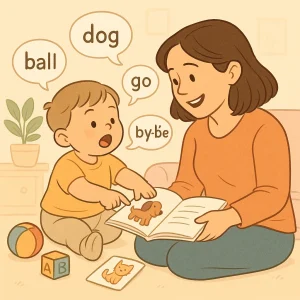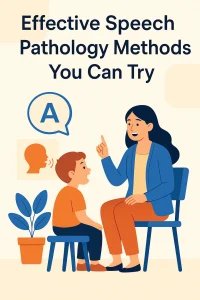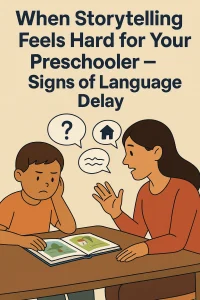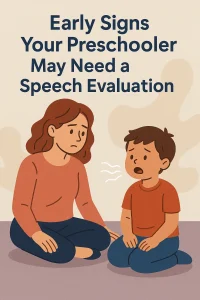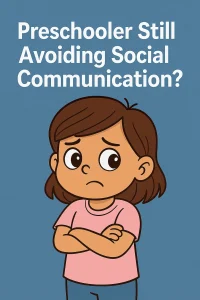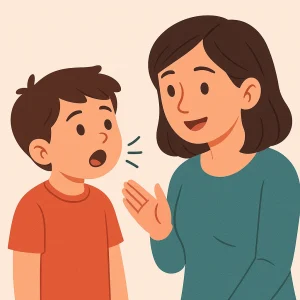When to Seek Speech Therapy for Your Child’s Articulation Delays
By Rajini D
Last Updated: December 19, 2024
Noticing your child’s speech isn’t as clear as their peers can be concerning. Articulation delays, which affect the clarity of a child’s speech, are common but vary widely among children. Early detection and intervention are key. Prompt speech therapy can help overcome these hurdles, enhancing your child’s communication skills effectively. Understanding these delays early ensures that minor issues don’t become persistent challenges, setting your child on a path to clear and confident communication.
Read more: Articulation Disorder in Children: Signs, Causes & Treatment
Understanding Articulation Delays
What are Articulation Delays?
Articulation delays happen when children find it hard to correctly pronounce speech sounds. For example, a child might say “wabbit” instead of “rabbit” or “thun” instead of “sun.” These issues can make it difficult for kids to be understood when they speak.
Causes of Articulation Delays
Several factors can lead to articulation delays:
- Genetic Factors: Sometimes, the tendency to develop speech difficulties can be inherited from family members.
- Environmental Influences: Children need a rich language environment to develop speech skills properly. Without enough interaction and conversation, they might not learn to speak clearly.
- Developmental Variations: Every child grows at their own pace. Some might take longer to start speaking clearly, and that’s okay. But if delays continue past the usual age for reaching speech milestones, it might be time to seek help from a speech therapist.
Signs Your Child May Need Speech Therapy
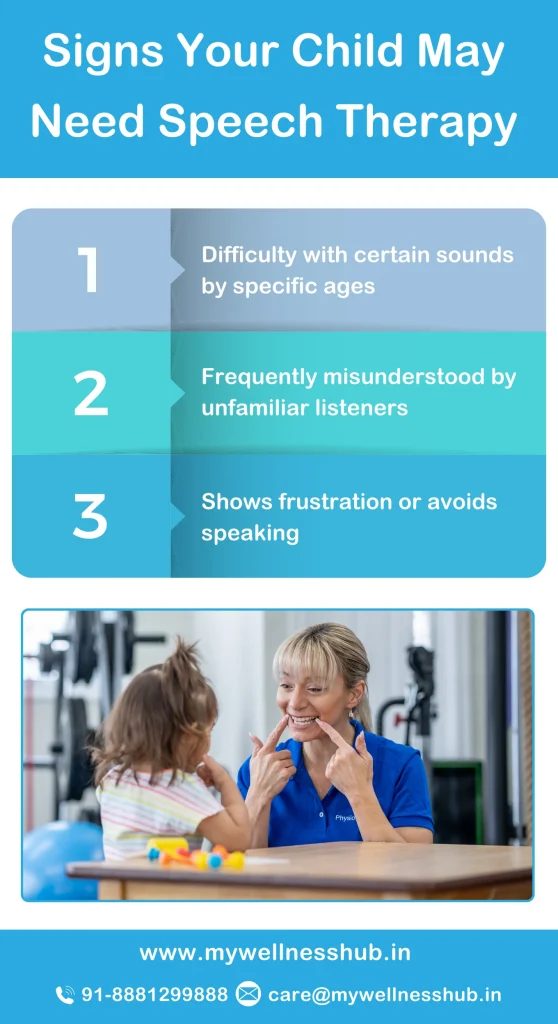
Key Indicators of Articulation Issues
Watching how your child speaks can tell you a lot about their speech development. Here are a few signs that might suggest they need some help with their speech:
- Difficulty with Certain Sounds: Children should be able to make certain sounds by certain ages. For example, if they can’t say the “r” sound by age six, they might need help.
- Being Hard to Understand: If people who don’t know your child well can’t understand them, this might mean their speech isn’t clear.
- Avoiding Talking: If your child avoids talking because they’re embarrassed or frustrated, it’s a sign they might be struggling with their speech.
Comparing Speech Milestones
It’s helpful to know what’s typical for children’s speech development:
- Normal Milestones: By three years old, strangers should understand most of what your child says. By five, they should understand nearly everything.
- Worrying Signs: If your child is harder to understand than other kids their age, or if their speech hasn’t improved much over time, it might be good to see a speech therapist.
Speech Development Milestones
| Age | Expected Milestones | Notes |
|---|---|---|
| 1 Year | Says first words (e.g., “mama”, “dada”) | Single words or simple phrases |
| 2 Years | Combines two words (e.g., “more juice”) | Increases vocabulary rapidly |
| 3 Years | Speech mostly understood by others | Can converse using 2-3 sentence phrases |
| 4 Years | Can tell stories; clear speech | Speech is understandable, even to unfamiliar listeners |
| 5 Years | Uses complete sentences and understands complex instructions | Speech is clear; uses full sentences |
Also Read: Speech Development Milestones: Your Child’s Talking Journey
Benefits of Early Speech Therapy Intervention
Improving Communication Skills
Starting speech therapy early can make a big difference in how clearly a child speaks. It helps them learn the correct way to make sounds and words, leading to clearer communication. This not only helps them be understood but also builds their confidence when talking to others.
The long-term benefits are significant. Children who begin speech therapy early are less likely to face learning and communication challenges later on. They tend to do better in school because they can express their thoughts clearly and participate fully in class.
Social and Academic Advantages
Speech therapy also improves a child’s social skills. With better speech, they can make friends more easily and fit in better at school. They’re more likely to join in games and conversations, which are important for their social and emotional growth.
In school, clear communication means better academic performance. Children who speak well are more involved in class, likely leading to better grades and a more enjoyable school experience.
How to Choose the Right Speech Therapist
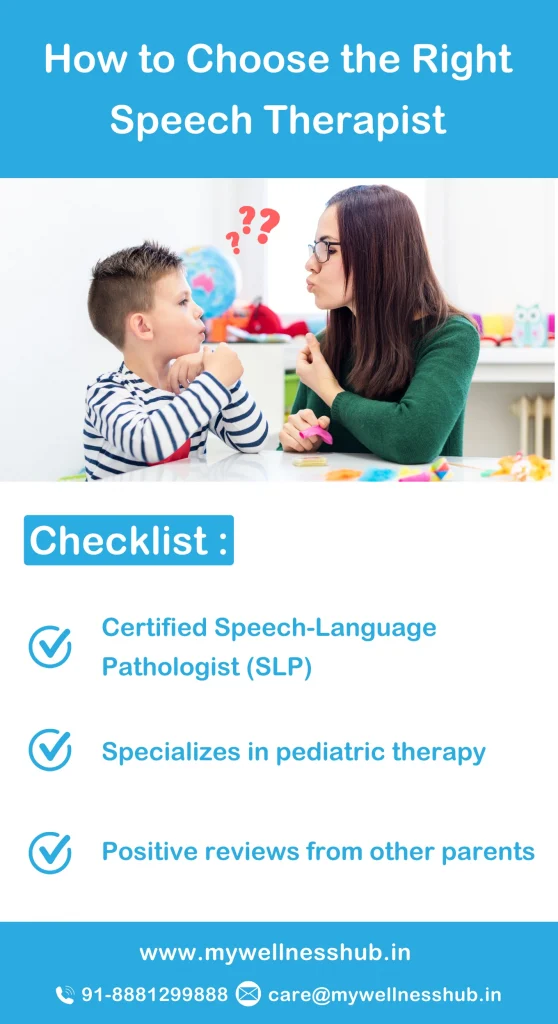
Finding a Qualified Speech-Language Pathologist
Choosing the right speech-language pathologist (SLP) is crucial for your child’s success in overcoming speech difficulties. Here’s what to consider when selecting an SLP:
- Credentials to Look For: Ensure that the speech therapist is certified by the appropriate board, such as the American Speech-Language-Hearing Association (ASHA), which awards the Certificate of Clinical Competence in Speech-Language Pathology (CCC-SLP). This certification indicates that the therapist has met rigorous academic and professional standards.
- Importance of Specialization in Pediatric Speech Therapy: Look for a therapist who specializes in pediatric speech therapy. Specialists in this area are better equipped to engage with children and understand the unique challenges and milestones of speech development in younger patients. They use techniques and tools that are specifically designed to interest and benefit children.
Preparing for Your First Visit
The first visit to a speech therapist is a significant step forward in your child’s development. Here’s how to prepare:
- What to Expect During the Initial Assessment: The initial assessment will likely include a detailed conversation about your child’s medical history, developmental milestones, and specific speech concerns. The therapist may use various standardized tests to evaluate your child’s speech and language abilities. This assessment helps the therapist create a personalized therapy plan.
- How to Prepare Your Child for a Visit to the Speech Therapist: It’s important to talk to your child about the visit beforehand in a positive and reassuring manner. Explain that the therapist is a friend who will help them speak more clearly. You might want to read a book or watch a video about visiting a therapist to make your child feel more comfortable. Ensure your child is well-rested and fed before the appointment to help them engage fully during the session.
About WellnessHub
Our Commitment to Child Wellness
At WellnessHub, we focus on helping children communicate better. Our goal is to make sure every child can express themselves clearly. We offer specialized pediatric speech therapy tailored to each child’s needs, using proven methods to improve their speech and language skills.
Why Choose WellnessHub for Your Child’s Speech Therapy
Our team consists of experienced, certified speech-language pathologists who are skilled. We create personalized therapy plans for every child, adjusting the plan as they progress to ensure they get the most effective treatment.
Choosing WellnessHub means your child will receive caring, professional support that focuses on their specific needs. Reach out to us to find out how we can help your child develop better communication skills and confidence.
Conclusion
Catching and treating speech delays early is key to helping your child succeed. If you notice your child struggling with speech, it’s important to get help quickly. At Wellness Hub, our expert speech-language pathologists are ready to support your child with personalized care. Don’t wait to seek advice if you’re worried about your child’s speech abilities. Contact us today for a consultation and start your child on the path to clear communication.
Frequently Asked Questions:
1. What is an articulation delay?
An articulation delay is when children have difficulty forming sounds correctly, which may cause unclear speech. This can involve omitting, substituting, or distorting sounds, making it hard for others to understand them. Early diagnosis and intervention can significantly improve speech clarity.
2. At what age should a child start speaking clearly?
Children typically start to speak clearly enough to be understood by strangers around age 3. If your child’s speech isn’t clear or if strangers struggle to understand them by this age, it might be time to consult a speech therapist.
3. How do I know if my child needs speech therapy?
Signs that your child might need speech therapy include difficulty with certain sounds, frustration or embarrassment while speaking, and consistent misunderstandings by people who aren’t familiar with them. If these issues persist, seeing a speech therapist could be beneficial.
4. What are the benefits of early speech therapy?
Early speech therapy can enhance communication skills, improving both the clarity and effectiveness of a child’s speech. This early intervention can boost self-esteem, social interactions, and academic performance, laying a solid foundation for future success.
5. How long does speech therapy take to show results?
The time it takes to see results from speech therapy can vary, but many children show improvements within a few months. The duration depends on the frequency of therapy sessions and the specific speech issues being addressed.
6. What should I expect during my child’s first speech therapy session?
The first speech therapy session often involves an evaluation where the therapist will assess your child’s speech and language abilities. This assessment helps the therapist create a personalized treatment plan aimed at addressing your child’s specific needs.
7. Can articulation delays affect a child’s academic performance?
Yes, articulation delays can impact academic performance. Difficulties in clear communication can hinder a child’s ability to participate in class discussions and can affect their reading and writing skills. Addressing these delays early can help improve their academic engagement and success.
8. What qualifications should I look for in a speech therapist?
When choosing a speech therapist, ensure they have the required certification, typically a Certificate of Clinical Competence in Speech-Language Pathology (CCC-SLP) from an accredited body like the American Speech-Language-Hearing Association (ASHA). Experience in pediatric speech therapy is also crucial.
9. How can I prepare my child for speech therapy?
Prepare your child for speech therapy by discussing what will happen during the sessions in a positive and encouraging way. Explain that the therapist will help them speak more clearly. Keeping the conversation light and optimistic can help reduce any anxiety they might feel.
10. Where can I find a qualified speech therapist?
You can find qualified speech therapists through professional directories offered by organizations like ASHA, or by visiting specialized clinics and websites. For personalized pediatric care, check out WellnessHub’s Speech Therapy Section, which offers access to a range of certified professionals skilled in child speech therapy.
About the Author:
Rajini Darugupally
M.Sc., Speech-Language Pathologist (9+ years of experience)
Rajini is a passionate and dedicated Speech-Language Pathologist with over 9+ years of experience, specializing in both developmental speech and language disorders in children and rehabilitation in adults. Currently, at Wellness Hub, she thrives in a team environment that values innovation, compassion, and achieving results for their clients.
Book your Free Consultation Today
Parent/Caregiver Info:
Client’s Details:
* Error Message


